Unit 3 第7课时【复习课】(共61张PPT)-【高效课堂】2022-2023学年八年级英语下册精品课件(人教版)
文档属性
| 名称 | Unit 3 第7课时【复习课】(共61张PPT)-【高效课堂】2022-2023学年八年级英语下册精品课件(人教版) | 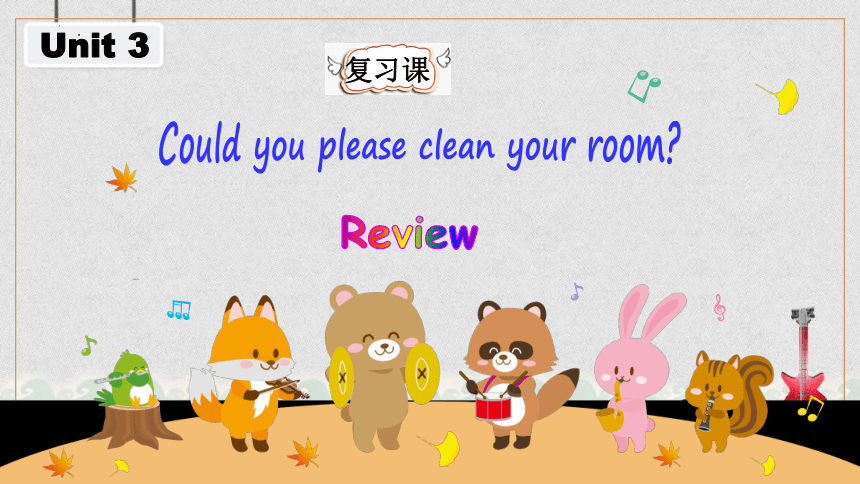 | |
| 格式 | pptx | ||
| 文件大小 | 1.2MB | ||
| 资源类型 | 教案 | ||
| 版本资源 | 人教新目标(Go for it)版 | ||
| 科目 | 英语 | ||
| 更新时间 | 2023-03-07 07:39:59 | ||
图片预览

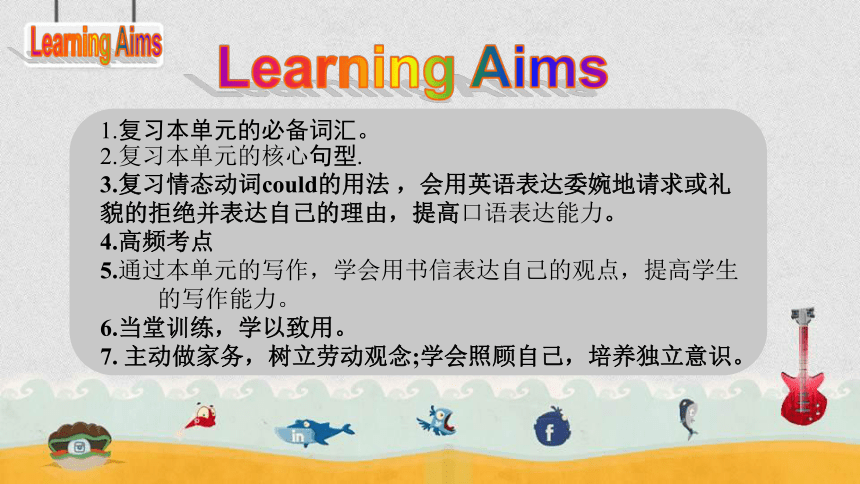
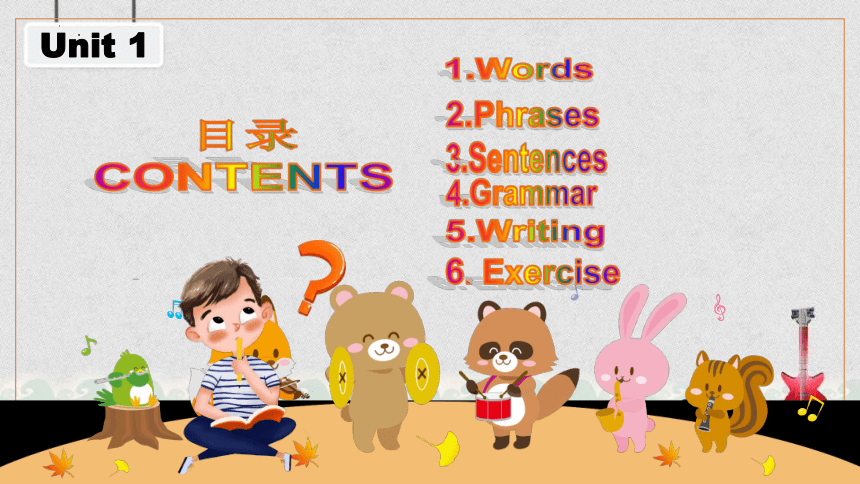

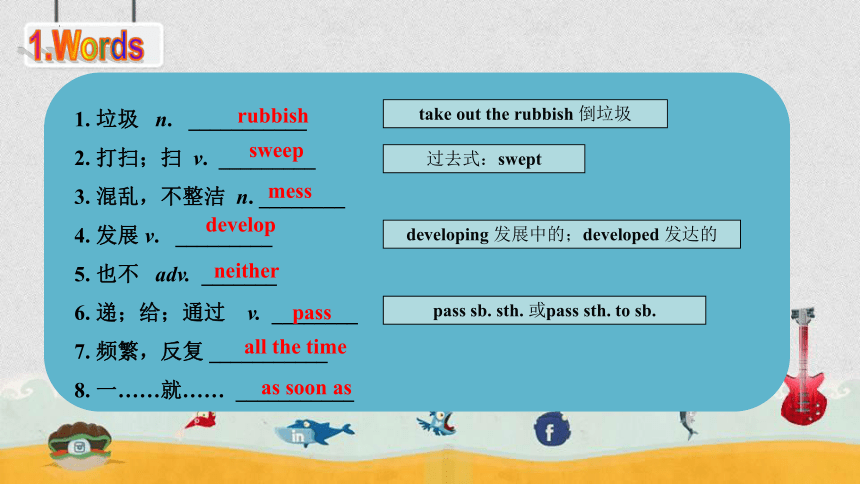
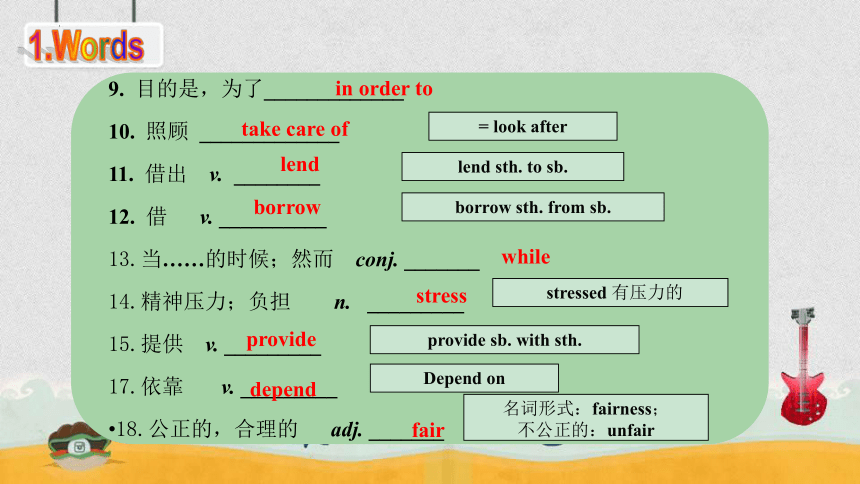
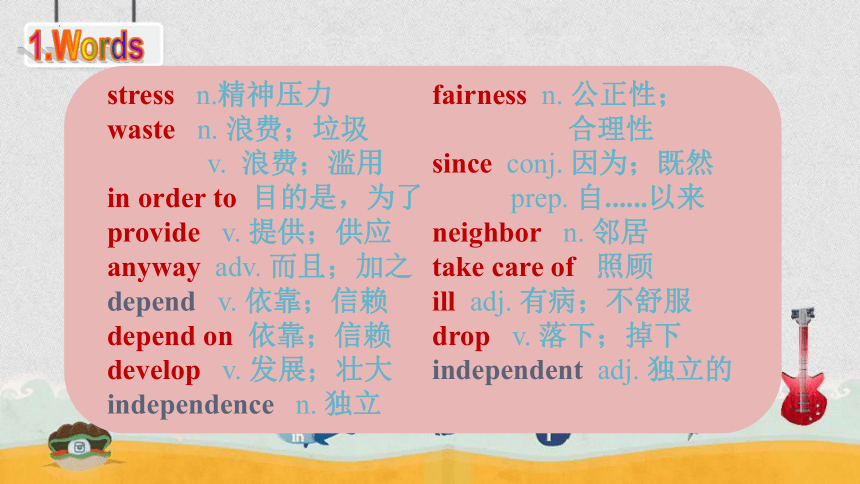
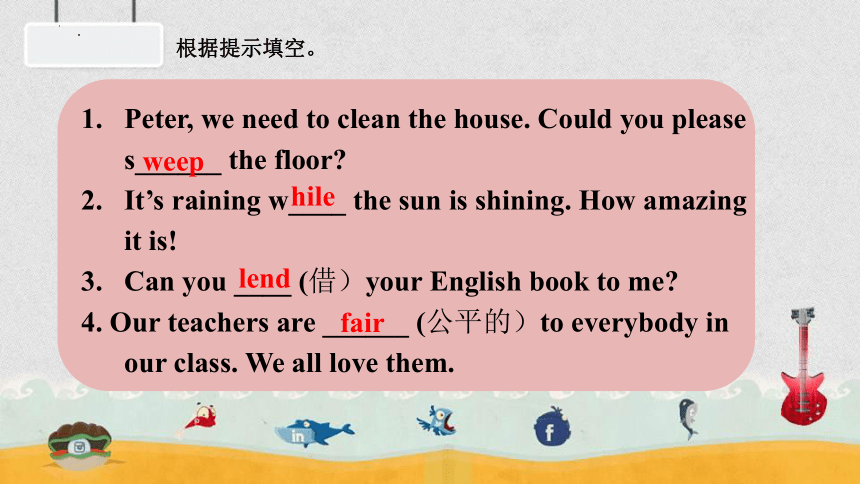
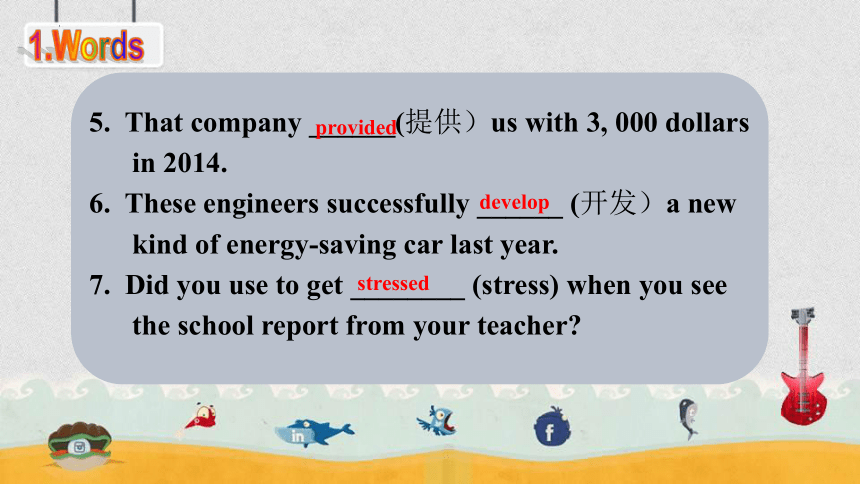
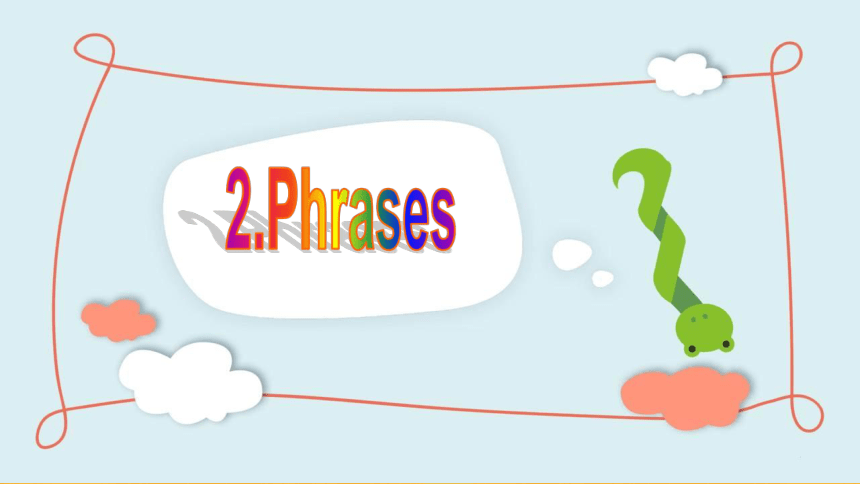
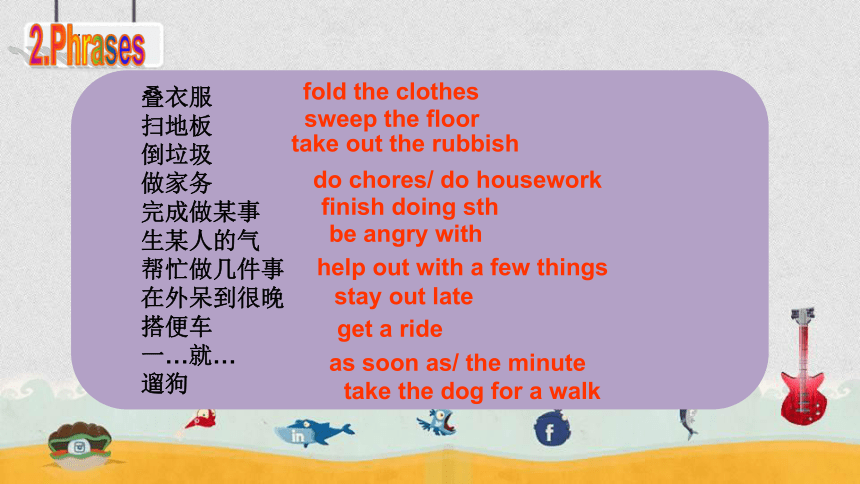
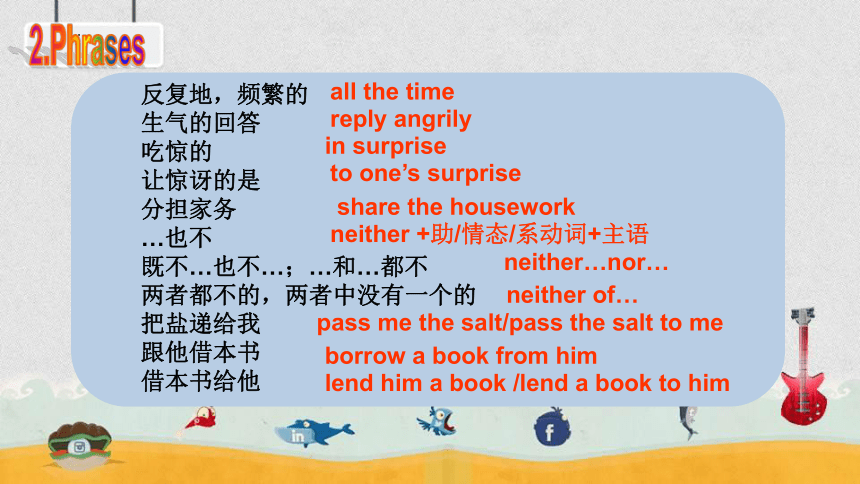
文档简介
(共61张PPT)
Review
Unit 3
复习课
Could you please clean your room
Learning Aims
Learning Aims
1.复习本单元的必备词汇。
2.复习本单元的核心句型.
3.复习情态动词could的用法 ,会用英语表达委婉地请求或礼貌的拒绝并表达自己的理由,提高口语表达能力。
4.高频考点
5.通过本单元的写作,学会用书信表达自己的观点,提高学生的写作能力。
6.当堂训练,学以致用。
7. 主动做家务,树立劳动观念;学会照顾自己,培养独立意识。
目录
CONTENTS
2.Phrases
1.Words
4.Grammar
5.Writing
3.Sentences
6. Exercise
Unit 1
Review
1.Words
1.Words
1. 垃圾 n. ___________
2. 打扫;扫 v. _________
3. 混乱,不整洁 n. ________
4. 发展 v. _________
5. 也不 adv. _______
6. 递;给;通过 v. ________
7. 频繁,反复 ___________
8. 一……就…… ___________
rubbish
sweep
mess
develop
neither
pass
all the time
as soon as
take out the rubbish 倒垃圾
过去式:swept
pass sb. sth. 或pass sth. to sb.
developing 发展中的;developed 发达的
1.Words
9. 目的是,为了_____________
10. 照顾 _____________
11. 借出 v. ________
12. 借 v. __________
13.当……的时候;然而 conj. _______
14.精神压力;负担 n. _________
15.提供 v. _________
17.依靠 v. _________
18.公正的,合理的 adj. _______
in order to
take care of
lend
borrow
while
stress
provide
depend
fair
stressed 有压力的
= look after
lend sth. to sb.
borrow sth. from sb.
provide sb. with sth.
名词形式:fairness;
不公正的:unfair
Depend on
1.Words
stress n.精神压力
waste n. 浪费;垃圾
v. 浪费;滥用
in order to 目的是,为了
provide v. 提供;供应
anyway adv. 而且;加之
depend v. 依靠;信赖
depend on 依靠;信赖
develop v. 发展;壮大
independence n. 独立
fairness n. 公正性;
合理性
since conj. 因为;既然
prep. 自......以来
neighbor n. 邻居
take care of 照顾
ill adj. 有病;不舒服
drop v. 落下;掉下
independent adj. 独立的
Peter, we need to clean the house. Could you please s______ the floor
It’s raining w____ the sun is shining. How amazing it is!
Can you ____ (借)your English book to me
4. Our teachers are ______ (公平的)to everybody in our class. We all love them.
根据提示填空。
weep
hile
lend
fair
1.Words
5. That company ______(提供)us with 3, 000 dollars in 2014.
6. These engineers successfully ______ (开发)a new kind of energy-saving car last year.
7. Did you use to get ________ (stress) when you see the school report from your teacher
provided
develop
stressed
2.Phrases
2.Phrases
叠衣服
扫地板
倒垃圾
做家务
完成做某事
生某人的气
帮忙做几件事
在外呆到很晚
搭便车
一…就…
遛狗
fold the clothes
sweep the floor
take out the rubbish
do chores/ do housework
finish doing sth
be angry with
help out with a few things
stay out late
get a ride
as soon as/ the minute
take the dog for a walk
2.Phrases
反复地,频繁的
生气的回答
吃惊的
让惊讶的是
分担家务
…也不
既不…也不…;…和…都不
两者都不的,两者中没有一个的
把盐递给我
跟他借本书
借本书给他
all the time
reply angrily
in surprise
to one’s surprise
share the housework
neither +助/情态/系动词+主语
neither…nor…
neither of…
pass me the salt/pass the salt to me
borrow a book from him
lend him a book /lend a book to him
2.Phrases
讨厌做某事
尽量做某事
尽量不做某事
买些饮料和点心
足够的压力
浪费时间
在某事上花时间
花时间/金钱做某事
目的是,为了
为某人提供某物
介意某事
介意做某事
hate to do sth/hate doing sth
try to do sth
try not to do sth
buy some drinks and snacks
enough stress
a waste of time
spend time on sth
spend some time/money (in) doing sth
in order to/ so that
provide sth for sb/provide sb with sth
mind sth
mind doing sth
Review
3.Sentences
3.Sentences
1.如果她看到这么乱,她会不高兴的
2.我一坐在电视前,妈妈就过来了
3.我和你一样累
She won’t be happy if she sees this mess.
The minute I sat down in front of the TV,
my mom came over.
As soon as I sat down in front of the TV,
my mom came over
I am as tired as you.
3.Sentences
4.她没干家务活,我也没干
She didn’t do housework, neither did I.
She didn’t do housework,
I didn’t do housework, either.
5.她和我都没干家务活
6.我俩都没干家务活
Neither she nor I did housework.
Neither of us did housework
3.Sentences
7.你帮我洗盘子时我会做作业的
8.我们能让他们只做份内的是吗?
9.我不介意倒垃圾
I will do my homework ______ you help me
with housework
Could we just let them do their job as students?
while
I don’t mind taking out the rubbish
3.Sentences
10.为了取得好成绩他们应该把时间花在功课上
They should ______ _______ _____ _____schoolwork _____ _____ ___ get good grades.
They should ______ _______ _____ ___ schoolwork __ _____ she can get good grades.
spend their time
on
in order to
spend their time on
so that
3.Sentences
11.他们没有必要打架
12为孩子们在家里提供一个干净、舒适的环境是家长的责任____ the _______ ______ _____ ______ a clean and _________ __________ at home ____ their children.
There’s no need for them to fight.
It’s
parents’ job to provide
comfortable environment
for
13.仅仅在学校取得好成绩是不够的
______________ just _______________ at school.
14.现在的孩子太依赖父母
_______ these days ______ __ their parents _____ _______.
It’s not enough to
get good grades
Children
depend on
too much
3.Sentences
15.干家务帮助培养孩子的独立性并且教他们如何照料自己
______ ______ helps ____ ______ ______ _________ and _____ them ____ ____ look after themselves.
Doing chores
to develop children’s
independence
teach
how to
3.Sentences
16.既然他们和父母住在一座房子里,他们就应该知道每个人都应该参与保持房子干净、整洁
的劳动中
______ they live in one house with their parents, they should know _____ ______
should ____ ___ _______ ____ _____ it clean and ______.
Since
that everyone
do their part in keeping
tidy
17.结果,他经常生病,成绩也下滑了
18.孩子越早学会独立,对他们的未来就越好
As a result, he often fell ill and his grades
dropped。
The earlier kids learn to be independence ,
the better it is for their future.
Review
4.Language points
Language points
用法1:both直接修饰名词时,不加of。如:
①Both children won prizes. 两个孩子都得了奖。
【注意】不能说both of children,但可以说 both of the children.
②I've got oil on both hands. 我两手都是油。
【注意】不能说both of hands,可说both of my hands。
用法2:both+(of) +the/ 物主代词/指示代词+名词,如:
Both of the cats are asleep.
用法3:在人称代词前一定要用both of,不能说 both we或 both
us,但可以说us both, them both等。
①Both of us like skating. 我们俩都喜欢滑冰。
②I want both of them. 两个我都要。
用法4:both与动词连用时,在句中的位置有以下三种情况:
(1)放在动词be之后。如:
The children are both lovely. 这两个孩子都很可爱。
【注意】在感叹句或简略答语中,both应置于be之前。如:
How beautiful they both are! 他们俩多漂亮啊!
----Are you both from Japan ----Yes, we both are.
(2)放在行为动词前。如:
We both like watching TV.我们俩都喜欢看电视。
(3)当谓语动词是由几部分组成时,both要放在第一个助动词后。
We will both study Japanese.
Language points
用法5:both…and…”起连接词作用,作“两者都”、“又……又”
注意:“both…and…”连接两个主语时,谓语动词用复数。
Both milk and meat are good for our bodies.
用法6:“both+否定式谓语+…”构成部分否定:
Both students are not 15 years old.
Both of the books are not helpful.
辨析:both (两者) 都
all (三者或以上) 都
Language points
【辨析】loudly&loud
1. 二者做副词时, loudly与loud含义相同均含有“高声地、大声 地”的意思,用以说明声音的强度,含“喧闹”的意味。一般只 与动词 speak, talk, laugh, sing 等连用, loudly 比 loud 使用范围更广,它除与 speak, talk, laugh 等动词连用外,还可与其他表示声响的动词连用。
Speak loud/loudly.
The boys all laughed loud/loudly.
The policeman knocked at the door loudly.
2. loud还可以做形容词,loudly只能做副词。下面例句中的loud
都不能用loudly
Suddenly there was a loud sound.
His voice became loud. 他提高了嗓门
用法1:care n. (不可数名词) 照顾、照料
The patient needs care. 这个病人需要照顾。
【拓展】短语∶take care of sb./sth.=look aftersb./sth.
Please take care of yourself. =Please look after yourself.
用法2:care v.在意;在乎、关心
care about sth./sb. 在意某事;关心某人
I don't care what others think. 我不在乎其他人怎么想。
They care about environment protection. 他们在乎环境保护。
My grandmother cared about me. 我的奶奶关心我。
be different from的意思是:和…...不同
London is different from Shanghai.
联想记忆:be similar to 和......相似
be the same as 和......相同
He is similar to his father.
This book is similar to that one.
Her book is the same as mine.
reach 伸出手(或脚)
例句:They tried to reach out to these poor people.
辨析:get (to),arrive(in/at) & reach
这三个动词或词组都有“到达”意思,其区别如下:
1. arrive是不及物动词,表示“到达、抵达某地(尤指行程的终
点)”,后接介词at或in,一般in接大地方,at接小地方,若是地点副词,不用介词。例如:
Do you know what time the plane arrive in Moscow
They arrived at the station at 8 this morning.
Her mother saw her when she arrived home
2. get 和arrive一样,get也是不及物动词,只是它多用于口语,其后接的介词to,后面如接副词,则不用介词to。
I get to school at about 7:30 every day.
They got there last night.
3. reach 是及物动词,直接接宾语,无须介词,属正式用语。
When she reached home,her mother asked,“What lessons did you have today ”
They reached Beijing on February 17.
Review
5.Grammar
5.Grammar
作为can的过去式,表示过去的能力。如:
Could you speak English then? 那时你能讲英语吗?
He said he couldn't follow me.他说他跟不上我。
2. Could 可以表示委婉的说法
Could you please could you room
情态动词could
5.Grammar
一、用can, can’t, could, couldn’t填空。
1. — ______ you speak English
—No, I ______.
2. — ______ you ride a bike last year
— No, I _________.
3. — _______ you clean the room, please
— Sure.
Can
can
Could
couldn’t
Could
5.Grammar
二、单项选择。
1. — Could you look after my dog for me while we’re away
—____.
Yes, I can’t B. No, I’m not
C. With pleasure D. Sorry, I can
2. —Could you tell me a good place to eat
—____. There’s one nearby.
Thanks a lot B. Me neither
C. Sorry, I’m new here D. Of course
5.Grammar
--Yes, sure./ Of course. / All right. / Certainly./OK./No problem.
--Sorry, I can’t. I have to / must...
--Sorry, I can’t. I am doing …
--Sorry, I can’t. I am going to …
--Can you ...
Make polite requests礼貌提出请求
--Could you please …
Could you please sweep the floor
= ___________you please sweep the floor?
Would/Will
= Would you mind ___________________?
sweeping the floor
to come
Let’s
Shall we
How/What about
其他表示礼貌邀请或提建议的句型:
1) Would you like /love ________to the party
2) _______________coming to the party ...怎样?
3)_______come to the party. 让咋们…
4) _________come to the party 咋们将…
5)___________________come to my party
为什么不……
Why don’t you/
Why not
Review
6.Writing
6.Writing
Write a letter to the Sunday Mail and express your opinion.
Dear Sir or Madam,
I think /believe that ________________.
I agree/disagree that ________________.
I think it is fair/unfair for children to ________________.
I think children should/should not ____
because __________________________.
For example, they should/
should not ________________________
because __________________________.
Yours truly,
__________
6.Writing
1. 信头:发信人地址和日期。
有时可省去发信人地址,但一般要写日期。放在信纸的右上方。
2. 称呼:对收信人的尊称。
常用Dear,后用名字,而Mr,Mrs,Miss后不能单独用名字,而是姓或姓与名,如:John Smith的称呼,是Mr Smith,Mr John Smith或 Dear John。称呼后用逗号。
3. 正文。
写作指导
4. 结尾:发信人对收信人的谦称或敬语。放在信的右下方。要特别注意英语习惯,不可根据汉语意思写“此致敬礼”、“祝您健康”之类的中国式的结尾语。
写给同龄人或年长的朋友: Yours sincerely,Yours等等。
写给亲朋好友: Love,Best wishes等等。
5. 签名:一般在结尾语的下面一行。
6.Writing
常见私人信件的开头方式:
高兴:I was so glad/pleased/happy to receive your letter.
感谢:Thank you for your wonderful gift / your interesting letter.
关心与询问:How are you these days?/ How are you getting on these days?/ How are you getting on with your work/studies?
抱歉:I am sorry that I did not write to you sooner but I have been very busy these days.
6.Writing
help with housework and chores at home
have enough stress from school
spend the time on school work in order to…
There is no need for them to…
It is important for sb. to do sth.
It’s not enough to…
develop children’s independence
The more…, the more…
Useful phrases
写作技巧
本单元的话题为“谈论学生是否应该做家务”, 在写相关作文时应该注意的事项及主要句式有:
Ⅰ. 写此类对话或文章时的注意事项:
掌握和话题相关的单词、短语和句型结构。
明确对话或文章结构: 开头部分提出自己的观点,学生是否应该做家务;第二部分针对自己的观点做进一步的阐述,是文章的主体部分;最后再做总结。
找准时态与人称,理清写作顺序, 将文章的要素有机地结合起来。
写作技巧
Ⅱ. 写此类文章时的主要句式:
I think students should help their parents with housework.
It’s not enough to just get good grades.
Doing chores can help students learn how to look after themselves.
Doing chores can help to develop children’s independence.
The earlier kids learn to be independent, the better it is for their future.
0
An example:
Dear Kid,
Most of us probably don’t like doing chores. And most of us think that cleaning the bathroom or cooking dinner for the family makes us tired. However, the fact is that someone has to do it. Most of the time, our parents have to do the housework. Is it really fair I think it is important for us to do some chores.
Firstly, Doing housework is really not as bad as it sounds. We are able to take care of ourselves.
Doing some chores will show that we are becoming more and more independent.
Secondly, Some of us may think that we are too busy to do chores. But most parents work all day and are then expected to keep a clean house! So we should try our best to do some chores. Learning to do housework can provide us with valuable skills for the future. It gives us a sense of responsibility.
So next time you see something that needs to be done at home, do it yourself and show that you can do anything.
Yours truly,
Nancy
Dear Sir or Madam,
I believe that children should do some chores at home. I disagree that children’s only job is to study hard and do well at school. Of course it is important for children to study hard. However, I think it is unfair for children to expect their parents to work hard outside and do all the household chores, too. I think children should at least do some simple chores to help their busy parents.
For example, they should make their own beds and clean their own rooms because they are the ones who use these. They may not have time to help with the other parts of the house, but they should try to be responsible for their own area. This will help them to grow up to be independent and responsible adults.
Yours truly,
Chen Shi
Review
7.Exercises
7.Exercises
1. Grace this game every time we play.
A. wins B.won C.will win D.winning
2. —Did you the first place of the football match
—Of course we did, We all the other teams.
A. beat; beat B. beat; won C. win; won D. win; beat
3. —Jeff, our team the match.
—Well done. Congratulations!
A. beat B.failed C.won D.try
4. Jim says Lucy is similar me, but I think she is different me.
A.as; from B.to; from C.to; to D.as; to
A
B
C
D
一. 单项选择.
7.Exercises
5. —Can you play volleyball or basketball
— of them. I'm good at ball games.
A. Both B. Either C. Neither D. All
6. —When will the train
—Sorry, I don't know. You may ask the man over there.
A.get to B. reach C. arrive at D. arrive
7. — When will Mr. Green Beijing
—In a week.
A. reach B. get C. arrive D. come
A
A
D
7.Exercises
( )8. —Could you go to the bookshop with me
—_____. I just want to buy some books.
A. Sorry, I’m busy B. Of course not
C. Sure D. I hope not
C
( )9. —Could you please sweep the floor
—_____. I have to do my homework.
A. Yes, sure B. No problem
C. Sorry, you can’t D. Sorry, I can’t
D
( )10. —Could I go to the movies this weekend, Dad
—_____. But you have to come back before nine.
A. Yes, you can B. No, thanks
C. No, you can’t D. I’d love to
A
二. 请按括号内的要求完成下列句子。
1. I went to Bill’s house yesterday. (改为一般疑问句)
___ you __ to Bill’s house yesterday
2. Wash his bowl after dinner. (改为否定句)
__________ his bowl after dinner.
Did
go
Don’t wash
3. Remember to clean your room. (改为同义句)
___________ to clean your room.
4. Did your brother have a great time at the party (改为同义句)
Did your brother ___________ at the party
5. You should stay at home and look after your sick father. (改为同义句)
You should stay at home and __________ your sick father.
Don’t forget
enjoy himself
take care of
1. 你怎么了?What’s ______ with you
2. 我父母不允许我与朋友外出闲逛。
My parents don’t _____ me __ hang ___
with my friends.
3. 尽管他错了,但那又不是一件大事。
________, he’s wrong, it’s not a ___ ____.
4. 其次,为什么不坐下与你弟弟进行交流?
________, why don’t you sit down and
____________ ____ your brother
三. 完成句子.
allow to out
Although big deal
wrong
Secondly
communicate with
5. 相反,他看自己所喜欢的一直到深夜。
_______, he watches ________ he wants ____ late at night.
6. 他应该和朋友交谈一下,以便于他可以说一声对不起。
He ______ talk to his friends ___ ____ he can say he’s sorry.
until
Instead whatever
should so that
7. 为什么不让孩子们顺其自然呢?
Why don’t they ___ the ____ ___ kids.
8. 人们不应该逼孩子们太紧。
People shouldn’t ____ their children so ____.
let kids be
push hard
Thank you !
Review
Unit 3
复习课
Could you please clean your room
Learning Aims
Learning Aims
1.复习本单元的必备词汇。
2.复习本单元的核心句型.
3.复习情态动词could的用法 ,会用英语表达委婉地请求或礼貌的拒绝并表达自己的理由,提高口语表达能力。
4.高频考点
5.通过本单元的写作,学会用书信表达自己的观点,提高学生的写作能力。
6.当堂训练,学以致用。
7. 主动做家务,树立劳动观念;学会照顾自己,培养独立意识。
目录
CONTENTS
2.Phrases
1.Words
4.Grammar
5.Writing
3.Sentences
6. Exercise
Unit 1
Review
1.Words
1.Words
1. 垃圾 n. ___________
2. 打扫;扫 v. _________
3. 混乱,不整洁 n. ________
4. 发展 v. _________
5. 也不 adv. _______
6. 递;给;通过 v. ________
7. 频繁,反复 ___________
8. 一……就…… ___________
rubbish
sweep
mess
develop
neither
pass
all the time
as soon as
take out the rubbish 倒垃圾
过去式:swept
pass sb. sth. 或pass sth. to sb.
developing 发展中的;developed 发达的
1.Words
9. 目的是,为了_____________
10. 照顾 _____________
11. 借出 v. ________
12. 借 v. __________
13.当……的时候;然而 conj. _______
14.精神压力;负担 n. _________
15.提供 v. _________
17.依靠 v. _________
18.公正的,合理的 adj. _______
in order to
take care of
lend
borrow
while
stress
provide
depend
fair
stressed 有压力的
= look after
lend sth. to sb.
borrow sth. from sb.
provide sb. with sth.
名词形式:fairness;
不公正的:unfair
Depend on
1.Words
stress n.精神压力
waste n. 浪费;垃圾
v. 浪费;滥用
in order to 目的是,为了
provide v. 提供;供应
anyway adv. 而且;加之
depend v. 依靠;信赖
depend on 依靠;信赖
develop v. 发展;壮大
independence n. 独立
fairness n. 公正性;
合理性
since conj. 因为;既然
prep. 自......以来
neighbor n. 邻居
take care of 照顾
ill adj. 有病;不舒服
drop v. 落下;掉下
independent adj. 独立的
Peter, we need to clean the house. Could you please s______ the floor
It’s raining w____ the sun is shining. How amazing it is!
Can you ____ (借)your English book to me
4. Our teachers are ______ (公平的)to everybody in our class. We all love them.
根据提示填空。
weep
hile
lend
fair
1.Words
5. That company ______(提供)us with 3, 000 dollars in 2014.
6. These engineers successfully ______ (开发)a new kind of energy-saving car last year.
7. Did you use to get ________ (stress) when you see the school report from your teacher
provided
develop
stressed
2.Phrases
2.Phrases
叠衣服
扫地板
倒垃圾
做家务
完成做某事
生某人的气
帮忙做几件事
在外呆到很晚
搭便车
一…就…
遛狗
fold the clothes
sweep the floor
take out the rubbish
do chores/ do housework
finish doing sth
be angry with
help out with a few things
stay out late
get a ride
as soon as/ the minute
take the dog for a walk
2.Phrases
反复地,频繁的
生气的回答
吃惊的
让惊讶的是
分担家务
…也不
既不…也不…;…和…都不
两者都不的,两者中没有一个的
把盐递给我
跟他借本书
借本书给他
all the time
reply angrily
in surprise
to one’s surprise
share the housework
neither +助/情态/系动词+主语
neither…nor…
neither of…
pass me the salt/pass the salt to me
borrow a book from him
lend him a book /lend a book to him
2.Phrases
讨厌做某事
尽量做某事
尽量不做某事
买些饮料和点心
足够的压力
浪费时间
在某事上花时间
花时间/金钱做某事
目的是,为了
为某人提供某物
介意某事
介意做某事
hate to do sth/hate doing sth
try to do sth
try not to do sth
buy some drinks and snacks
enough stress
a waste of time
spend time on sth
spend some time/money (in) doing sth
in order to/ so that
provide sth for sb/provide sb with sth
mind sth
mind doing sth
Review
3.Sentences
3.Sentences
1.如果她看到这么乱,她会不高兴的
2.我一坐在电视前,妈妈就过来了
3.我和你一样累
She won’t be happy if she sees this mess.
The minute I sat down in front of the TV,
my mom came over.
As soon as I sat down in front of the TV,
my mom came over
I am as tired as you.
3.Sentences
4.她没干家务活,我也没干
She didn’t do housework, neither did I.
She didn’t do housework,
I didn’t do housework, either.
5.她和我都没干家务活
6.我俩都没干家务活
Neither she nor I did housework.
Neither of us did housework
3.Sentences
7.你帮我洗盘子时我会做作业的
8.我们能让他们只做份内的是吗?
9.我不介意倒垃圾
I will do my homework ______ you help me
with housework
Could we just let them do their job as students?
while
I don’t mind taking out the rubbish
3.Sentences
10.为了取得好成绩他们应该把时间花在功课上
They should ______ _______ _____ _____schoolwork _____ _____ ___ get good grades.
They should ______ _______ _____ ___ schoolwork __ _____ she can get good grades.
spend their time
on
in order to
spend their time on
so that
3.Sentences
11.他们没有必要打架
12为孩子们在家里提供一个干净、舒适的环境是家长的责任____ the _______ ______ _____ ______ a clean and _________ __________ at home ____ their children.
There’s no need for them to fight.
It’s
parents’ job to provide
comfortable environment
for
13.仅仅在学校取得好成绩是不够的
______________ just _______________ at school.
14.现在的孩子太依赖父母
_______ these days ______ __ their parents _____ _______.
It’s not enough to
get good grades
Children
depend on
too much
3.Sentences
15.干家务帮助培养孩子的独立性并且教他们如何照料自己
______ ______ helps ____ ______ ______ _________ and _____ them ____ ____ look after themselves.
Doing chores
to develop children’s
independence
teach
how to
3.Sentences
16.既然他们和父母住在一座房子里,他们就应该知道每个人都应该参与保持房子干净、整洁
的劳动中
______ they live in one house with their parents, they should know _____ ______
should ____ ___ _______ ____ _____ it clean and ______.
Since
that everyone
do their part in keeping
tidy
17.结果,他经常生病,成绩也下滑了
18.孩子越早学会独立,对他们的未来就越好
As a result, he often fell ill and his grades
dropped。
The earlier kids learn to be independence ,
the better it is for their future.
Review
4.Language points
Language points
用法1:both直接修饰名词时,不加of。如:
①Both children won prizes. 两个孩子都得了奖。
【注意】不能说both of children,但可以说 both of the children.
②I've got oil on both hands. 我两手都是油。
【注意】不能说both of hands,可说both of my hands。
用法2:both+(of) +the/ 物主代词/指示代词+名词,如:
Both of the cats are asleep.
用法3:在人称代词前一定要用both of,不能说 both we或 both
us,但可以说us both, them both等。
①Both of us like skating. 我们俩都喜欢滑冰。
②I want both of them. 两个我都要。
用法4:both与动词连用时,在句中的位置有以下三种情况:
(1)放在动词be之后。如:
The children are both lovely. 这两个孩子都很可爱。
【注意】在感叹句或简略答语中,both应置于be之前。如:
How beautiful they both are! 他们俩多漂亮啊!
----Are you both from Japan ----Yes, we both are.
(2)放在行为动词前。如:
We both like watching TV.我们俩都喜欢看电视。
(3)当谓语动词是由几部分组成时,both要放在第一个助动词后。
We will both study Japanese.
Language points
用法5:both…and…”起连接词作用,作“两者都”、“又……又”
注意:“both…and…”连接两个主语时,谓语动词用复数。
Both milk and meat are good for our bodies.
用法6:“both+否定式谓语+…”构成部分否定:
Both students are not 15 years old.
Both of the books are not helpful.
辨析:both (两者) 都
all (三者或以上) 都
Language points
【辨析】loudly&loud
1. 二者做副词时, loudly与loud含义相同均含有“高声地、大声 地”的意思,用以说明声音的强度,含“喧闹”的意味。一般只 与动词 speak, talk, laugh, sing 等连用, loudly 比 loud 使用范围更广,它除与 speak, talk, laugh 等动词连用外,还可与其他表示声响的动词连用。
Speak loud/loudly.
The boys all laughed loud/loudly.
The policeman knocked at the door loudly.
2. loud还可以做形容词,loudly只能做副词。下面例句中的loud
都不能用loudly
Suddenly there was a loud sound.
His voice became loud. 他提高了嗓门
用法1:care n. (不可数名词) 照顾、照料
The patient needs care. 这个病人需要照顾。
【拓展】短语∶take care of sb./sth.=look aftersb./sth.
Please take care of yourself. =Please look after yourself.
用法2:care v.在意;在乎、关心
care about sth./sb. 在意某事;关心某人
I don't care what others think. 我不在乎其他人怎么想。
They care about environment protection. 他们在乎环境保护。
My grandmother cared about me. 我的奶奶关心我。
be different from的意思是:和…...不同
London is different from Shanghai.
联想记忆:be similar to 和......相似
be the same as 和......相同
He is similar to his father.
This book is similar to that one.
Her book is the same as mine.
reach 伸出手(或脚)
例句:They tried to reach out to these poor people.
辨析:get (to),arrive(in/at) & reach
这三个动词或词组都有“到达”意思,其区别如下:
1. arrive是不及物动词,表示“到达、抵达某地(尤指行程的终
点)”,后接介词at或in,一般in接大地方,at接小地方,若是地点副词,不用介词。例如:
Do you know what time the plane arrive in Moscow
They arrived at the station at 8 this morning.
Her mother saw her when she arrived home
2. get 和arrive一样,get也是不及物动词,只是它多用于口语,其后接的介词to,后面如接副词,则不用介词to。
I get to school at about 7:30 every day.
They got there last night.
3. reach 是及物动词,直接接宾语,无须介词,属正式用语。
When she reached home,her mother asked,“What lessons did you have today ”
They reached Beijing on February 17.
Review
5.Grammar
5.Grammar
作为can的过去式,表示过去的能力。如:
Could you speak English then? 那时你能讲英语吗?
He said he couldn't follow me.他说他跟不上我。
2. Could 可以表示委婉的说法
Could you please could you room
情态动词could
5.Grammar
一、用can, can’t, could, couldn’t填空。
1. — ______ you speak English
—No, I ______.
2. — ______ you ride a bike last year
— No, I _________.
3. — _______ you clean the room, please
— Sure.
Can
can
Could
couldn’t
Could
5.Grammar
二、单项选择。
1. — Could you look after my dog for me while we’re away
—____.
Yes, I can’t B. No, I’m not
C. With pleasure D. Sorry, I can
2. —Could you tell me a good place to eat
—____. There’s one nearby.
Thanks a lot B. Me neither
C. Sorry, I’m new here D. Of course
5.Grammar
--Yes, sure./ Of course. / All right. / Certainly./OK./No problem.
--Sorry, I can’t. I have to / must...
--Sorry, I can’t. I am doing …
--Sorry, I can’t. I am going to …
--Can you ...
Make polite requests礼貌提出请求
--Could you please …
Could you please sweep the floor
= ___________you please sweep the floor?
Would/Will
= Would you mind ___________________?
sweeping the floor
to come
Let’s
Shall we
How/What about
其他表示礼貌邀请或提建议的句型:
1) Would you like /love ________to the party
2) _______________coming to the party ...怎样?
3)_______come to the party. 让咋们…
4) _________come to the party 咋们将…
5)___________________come to my party
为什么不……
Why don’t you/
Why not
Review
6.Writing
6.Writing
Write a letter to the Sunday Mail and express your opinion.
Dear Sir or Madam,
I think /believe that ________________.
I agree/disagree that ________________.
I think it is fair/unfair for children to ________________.
I think children should/should not ____
because __________________________.
For example, they should/
should not ________________________
because __________________________.
Yours truly,
__________
6.Writing
1. 信头:发信人地址和日期。
有时可省去发信人地址,但一般要写日期。放在信纸的右上方。
2. 称呼:对收信人的尊称。
常用Dear,后用名字,而Mr,Mrs,Miss后不能单独用名字,而是姓或姓与名,如:John Smith的称呼,是Mr Smith,Mr John Smith或 Dear John。称呼后用逗号。
3. 正文。
写作指导
4. 结尾:发信人对收信人的谦称或敬语。放在信的右下方。要特别注意英语习惯,不可根据汉语意思写“此致敬礼”、“祝您健康”之类的中国式的结尾语。
写给同龄人或年长的朋友: Yours sincerely,Yours等等。
写给亲朋好友: Love,Best wishes等等。
5. 签名:一般在结尾语的下面一行。
6.Writing
常见私人信件的开头方式:
高兴:I was so glad/pleased/happy to receive your letter.
感谢:Thank you for your wonderful gift / your interesting letter.
关心与询问:How are you these days?/ How are you getting on these days?/ How are you getting on with your work/studies?
抱歉:I am sorry that I did not write to you sooner but I have been very busy these days.
6.Writing
help with housework and chores at home
have enough stress from school
spend the time on school work in order to…
There is no need for them to…
It is important for sb. to do sth.
It’s not enough to…
develop children’s independence
The more…, the more…
Useful phrases
写作技巧
本单元的话题为“谈论学生是否应该做家务”, 在写相关作文时应该注意的事项及主要句式有:
Ⅰ. 写此类对话或文章时的注意事项:
掌握和话题相关的单词、短语和句型结构。
明确对话或文章结构: 开头部分提出自己的观点,学生是否应该做家务;第二部分针对自己的观点做进一步的阐述,是文章的主体部分;最后再做总结。
找准时态与人称,理清写作顺序, 将文章的要素有机地结合起来。
写作技巧
Ⅱ. 写此类文章时的主要句式:
I think students should help their parents with housework.
It’s not enough to just get good grades.
Doing chores can help students learn how to look after themselves.
Doing chores can help to develop children’s independence.
The earlier kids learn to be independent, the better it is for their future.
0
An example:
Dear Kid,
Most of us probably don’t like doing chores. And most of us think that cleaning the bathroom or cooking dinner for the family makes us tired. However, the fact is that someone has to do it. Most of the time, our parents have to do the housework. Is it really fair I think it is important for us to do some chores.
Firstly, Doing housework is really not as bad as it sounds. We are able to take care of ourselves.
Doing some chores will show that we are becoming more and more independent.
Secondly, Some of us may think that we are too busy to do chores. But most parents work all day and are then expected to keep a clean house! So we should try our best to do some chores. Learning to do housework can provide us with valuable skills for the future. It gives us a sense of responsibility.
So next time you see something that needs to be done at home, do it yourself and show that you can do anything.
Yours truly,
Nancy
Dear Sir or Madam,
I believe that children should do some chores at home. I disagree that children’s only job is to study hard and do well at school. Of course it is important for children to study hard. However, I think it is unfair for children to expect their parents to work hard outside and do all the household chores, too. I think children should at least do some simple chores to help their busy parents.
For example, they should make their own beds and clean their own rooms because they are the ones who use these. They may not have time to help with the other parts of the house, but they should try to be responsible for their own area. This will help them to grow up to be independent and responsible adults.
Yours truly,
Chen Shi
Review
7.Exercises
7.Exercises
1. Grace this game every time we play.
A. wins B.won C.will win D.winning
2. —Did you the first place of the football match
—Of course we did, We all the other teams.
A. beat; beat B. beat; won C. win; won D. win; beat
3. —Jeff, our team the match.
—Well done. Congratulations!
A. beat B.failed C.won D.try
4. Jim says Lucy is similar me, but I think she is different me.
A.as; from B.to; from C.to; to D.as; to
A
B
C
D
一. 单项选择.
7.Exercises
5. —Can you play volleyball or basketball
— of them. I'm good at ball games.
A. Both B. Either C. Neither D. All
6. —When will the train
—Sorry, I don't know. You may ask the man over there.
A.get to B. reach C. arrive at D. arrive
7. — When will Mr. Green Beijing
—In a week.
A. reach B. get C. arrive D. come
A
A
D
7.Exercises
( )8. —Could you go to the bookshop with me
—_____. I just want to buy some books.
A. Sorry, I’m busy B. Of course not
C. Sure D. I hope not
C
( )9. —Could you please sweep the floor
—_____. I have to do my homework.
A. Yes, sure B. No problem
C. Sorry, you can’t D. Sorry, I can’t
D
( )10. —Could I go to the movies this weekend, Dad
—_____. But you have to come back before nine.
A. Yes, you can B. No, thanks
C. No, you can’t D. I’d love to
A
二. 请按括号内的要求完成下列句子。
1. I went to Bill’s house yesterday. (改为一般疑问句)
___ you __ to Bill’s house yesterday
2. Wash his bowl after dinner. (改为否定句)
__________ his bowl after dinner.
Did
go
Don’t wash
3. Remember to clean your room. (改为同义句)
___________ to clean your room.
4. Did your brother have a great time at the party (改为同义句)
Did your brother ___________ at the party
5. You should stay at home and look after your sick father. (改为同义句)
You should stay at home and __________ your sick father.
Don’t forget
enjoy himself
take care of
1. 你怎么了?What’s ______ with you
2. 我父母不允许我与朋友外出闲逛。
My parents don’t _____ me __ hang ___
with my friends.
3. 尽管他错了,但那又不是一件大事。
________, he’s wrong, it’s not a ___ ____.
4. 其次,为什么不坐下与你弟弟进行交流?
________, why don’t you sit down and
____________ ____ your brother
三. 完成句子.
allow to out
Although big deal
wrong
Secondly
communicate with
5. 相反,他看自己所喜欢的一直到深夜。
_______, he watches ________ he wants ____ late at night.
6. 他应该和朋友交谈一下,以便于他可以说一声对不起。
He ______ talk to his friends ___ ____ he can say he’s sorry.
until
Instead whatever
should so that
7. 为什么不让孩子们顺其自然呢?
Why don’t they ___ the ____ ___ kids.
8. 人们不应该逼孩子们太紧。
People shouldn’t ____ their children so ____.
let kids be
push hard
Thank you !
同课章节目录
- Unit 1 What's the matter?
- Section A
- Section B
- Unit 2 I'll help to clean up the city parks.
- Section A
- Section B
- Unit 3 Could you please clean your room?
- Section A
- Section B
- Unit 4 Why don't you talk to your parents?
- Section A
- Section B
- Unit 5 What were you doing when the rainstorm came
- Section A
- Section B
- Review of Units 1-5
- Unit 6 An old man tried to move the mountains.
- Section A
- Section B
- Unit 7 What's the highest mountain in the world?
- Section A
- Section B
- Unit 8 Have you read Treasure Island yet?
- Section A
- Section B
- Unit 9 Have you ever been to a museum?
- Section A
- Section B
- Unit 10 I've had this bike for three years.
- Section A
- Section B
